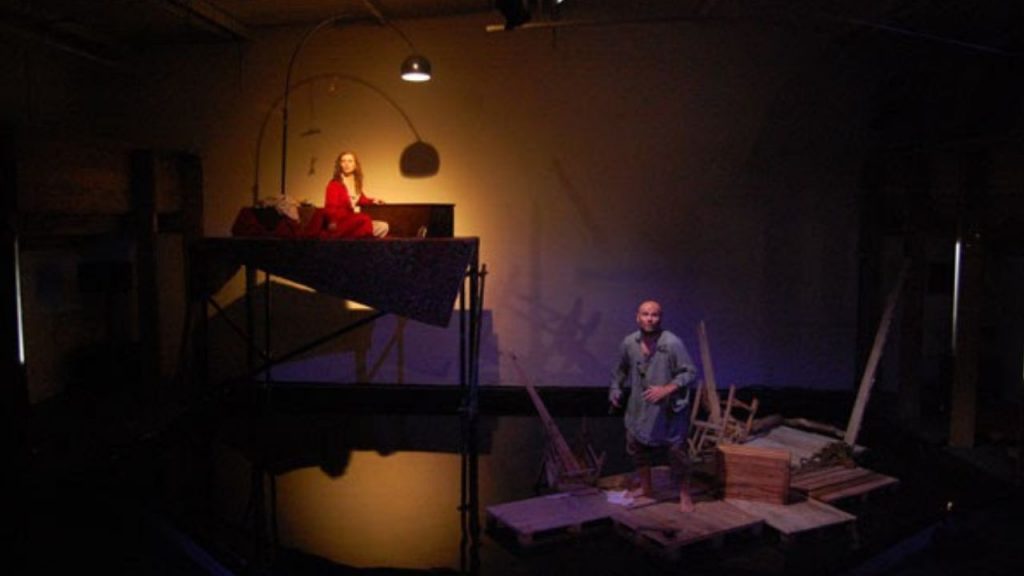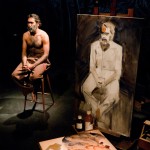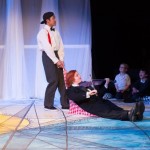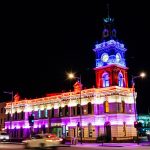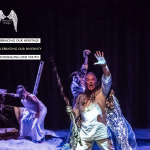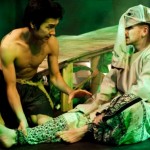Genre: Classical and Shakespeare
Venue: The Yard, Unit 2, Queens Yard, White Post Lane E9 5EN
Low Down
Before the theatre is found and a word is spoken for Shiver, the drama has already begun. Getting to the Yard Theatre to watch Theatre6’s rearrangementof Shakespeare’s Tempest is a drama. The theatre is tucked into an industrial factory site at E9 5EN. Once it is found you can hardly believe the welcoming site of an expansive and softly lit bar. A bell rings (a hand held one for those of us old enough to remember such school bells) and the entrance into the ‘theatre’ that you know was/ is a factory site. WOW! WOW! And WOW! Again. The stage setting that you encounter of a lagoon – that’s right you read it correctly – a wet and shimmering lagoon on which two ‘islands’ are placed: one created with wooden pellets on which sits an older man and the other rising out of the water (created with scaffolding) like an oil rig platform on which a young woman is stretched out. The tiered seating is beautifully curved. I remember thinking as I took my seat of the end of a wooden Elizabethan ship. The older man scraps away at something on the wood and as his emotions become more and more agitated he starts calling a name ‘Miranda’: Prospero is defined not by magic or power over men but through the fact that he is left with one relationship in his life, the one with his daughter. He tries hard throughout the next 45 minutes to convince the audience that he arrives at this point because he cares for her above all else. Miranda, elevated onto a higher plane, has another viewpoint.
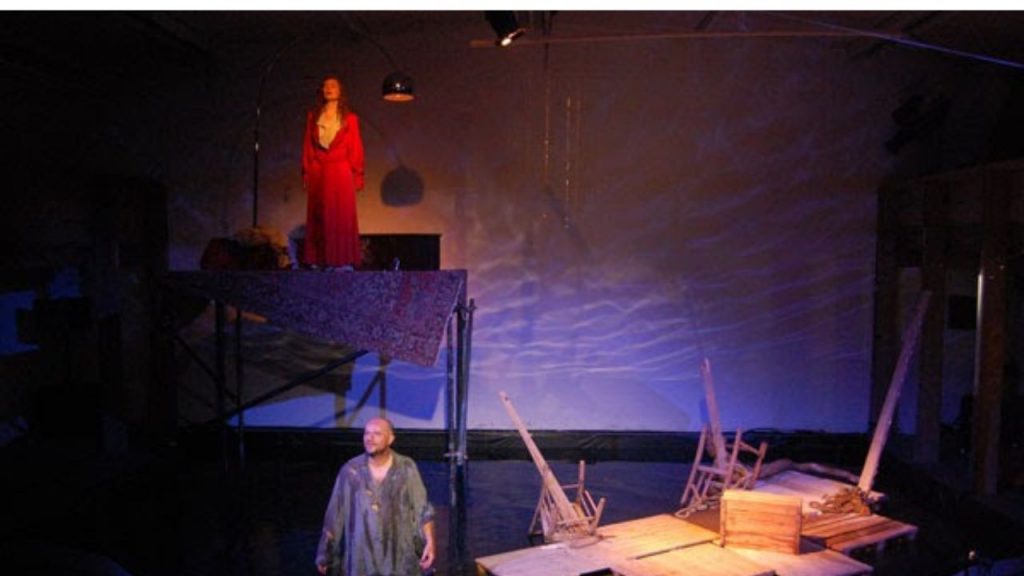
Review
If there exists an award for the ‘best set design’ for the Fringe it should go to Miriam Nabarro and Any Yardley of Theatre6 who have transformed the cavernous dimensions of a factory unit into Prospero’s island. The superlatives cannot be found to describe the dynamic nature of their creation in which the water itself becomes a character in the enactment of Prospero’s colossal parental failure of Mirand. The rippling effects picks up Vivienne Clavering’s lighting design magically. As the hauntingly beautiful original musical composition by Danyal Dhandy is mixed with it, the audience is in no doubt that ‘the elements’ are far more powerful than mere mortals who like Prospero have believed in the past that they can be ‘mastered’.
Tarek Iskander’s vision of a different Prospero, defined by his fathering and education of Miranda strips away at all the artifice of Shakespeare’s last comedy. As you hear the lines of the original play you sit uncomfortably wanting to protest ‘hang on a sec’ that’s not right! That curse was meant for Caliban not Prospero or that line was meant as a compliment not as an accusation. What do you mean that Ferdinand wasn’t what he seemed? The rearrangement of the text is in itself the disorientation towards a different Prospero who should have taken better care of his daughter.
In one sense it might seem moralistic and small-minded to accuse Prospero of being a rotten father. And then it hits you! In accepting the Shakespeare’s character clad with his powerful coat and staff we are in danger of accepting his divine right to manipulate everyone and everything. What if we were to view that power through just one role, over someone who did not ask to be brought to the island any more than she asked to be born, his daughter. Someone barely recognisable stands before us: a desperate man calling on his daughter to speak to him, to listen to him in order to rationalise his actions. The cloak and staff are nowhere to be seen. His rags and childish stone toys defining is irresponsibility towards his daughter and his own Kingdom of Milan.
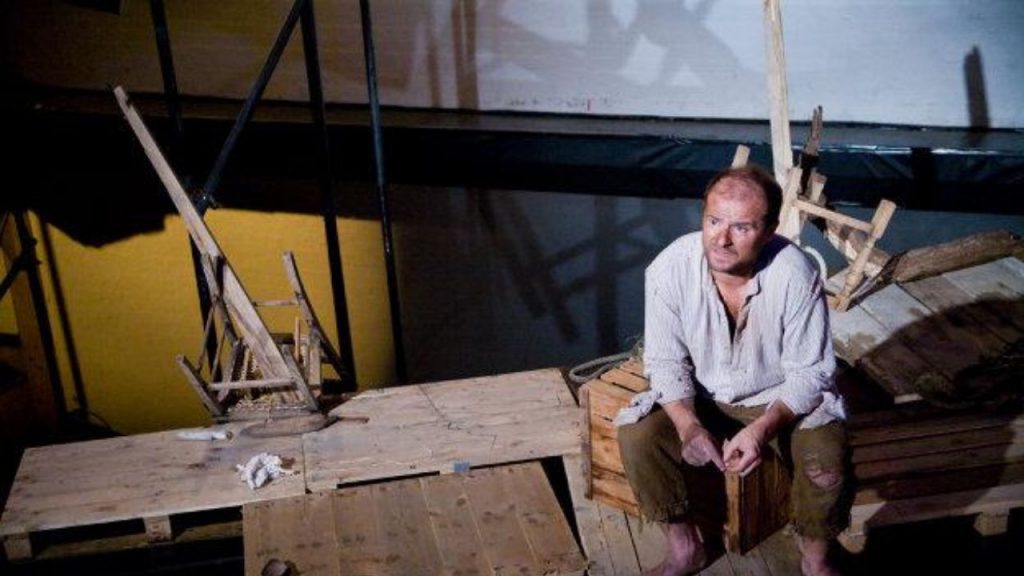
I remained uncomfortable at times with the way in which Tarek Iskander (mis)used Shakespeare’s text. There were times, in fact, that I felt the logic of both the content and context of the Tempest was stretched to breaking point. This was made more obvious because of the wonderful acting of Peter Stephens and Emily Tucker as Prospero and Miranda. Their rich voices working each nuanced meaning between the pair who seemed likely to remained imprisoned on the island for eternity. The acting skill needed to create a sense of intimacy while working on two different levels at quite a distance from each other was also obvious. In effect, they were enacting two solo performances while reacting and reflecting on every word the other character spoke. Both performers coloured and shaped their performances with detailed movements, gestures and facial expression. But despite their skills, the language still seemed to strain and pull against itself into another kind of artificial set of meanings, no less directorial than in Shakespeare’s Prospero and Tempest. But surely, the space to fail is as important as to succeed when working on the fringe….
Do all you can to see this rare and wonderful production. Go on an adventure as I did to E9 5EN and re-invigorate your mind, heart and soul on seeing the reason why fringe theatre exists in first place.
Reviewed by Josey De Rossi Wednesday 28th September, 2011
Website :
http://the-yard.co.uk/site/
This ends on Saturday so hurry to see it.
